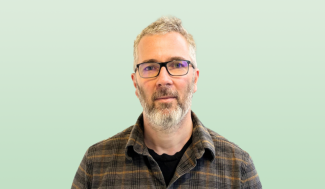Dafni Hadjieconomou joined Paris Brain Institute in September 2023. Her research will focus on the “brain-gut” axis, with the aim of identifying the fundamental, evolutionarily conserved mechanisms by which intestinal neurons regulate metabolism.
What is your background?
I am originally Greek Cypriot. I grew up on both in Greece and Cyprus. I have always been interested in discovery: when I was a child, I wanted to be an archeologist.
When I grew up, I started to get interested in biology and genetics. There was no research degree in this field in Greece, so I prepared to attend a university in the United States. But the year when I was taking my final exams at the end of school, such a degree was created. So, I stayed in Greece to undertake a bachelor’s degree in molecular biology and genetics. In the final year of this degree, I got hooked on neuroscience. It was super interesting to learn more about this black box that is the brain.
I then moved to London to do a master’s degree in clinical neuroscience. For my PhD, I chose developmental biology, with a focus on the nervous system, using flies. I got hooked on flies and flies’ genetics too; then by the end of my doctorate years I became more interested in the functioning nervous system within an adult animal and its role in regulating physiology. I moved to a lab at Imperial College London to study the enteric nervous system: the part of the nervous system that is innervating our gut. It is a fascinating topic.
Towards the end of my post-doc, I applied to the call for team leader positions at Paris Brain Institute, and I’m very happy to be here now.
Why did you apply to Paris Brain Institute?
I was very excited about the environment, the different types of questions that are addressed at the Institute, the expertise… I really see the synergies between basic and clinical research being supported and prioritised at Paris Brain Institute, and this is very impressive. The fact that world-leading scientists are interested in exploring different neuroscience questions here from different perspectives is very exciting too.
What will you be working on?
I will be working on how environmental challenges are computed by the gut-brain axis and how this computation is important for regulating our metabolism.
We will start with the study of flies as an model organism. It is a very strong model for genetic studies, but also great to perform behaviour and experiments. Importantly it is one of the few experimental systems in a living animal where we can really ask what does a single gene in a single neuron do in a given timepoint in the animal’s life. The two opposing aspects of physiological conditions in terms of metabolic balance that we will start with are:
- An unhealthy diet, a high sugar diet, a very well-established diet to induce obesity in flies.
- On the other part of the spectrum, it will be a model of higher physical activity, as a proxy for exercise. They are already models of physical activity for flies, but the innovative thing is to try and look at how this is sensed by the neurons of the gut. This has not been explored in any species.
On the one hand we have the high sugar diet that comes with all the bad things linked with obesity (cancer, shorter lifespan, metabolic stress…) and on the other hand, we have the benefits of exercise, like what we see in humans. The big question is “are the gut neurons involved?”.







